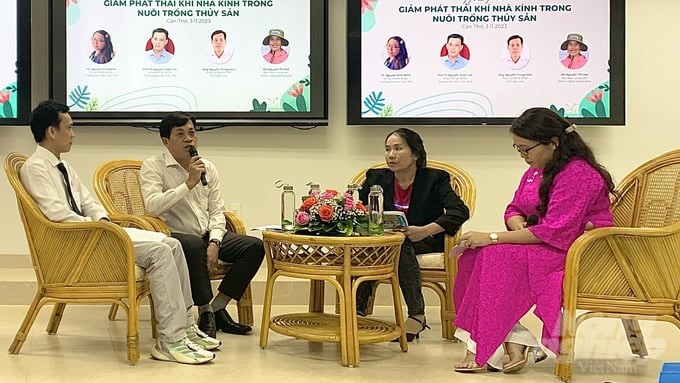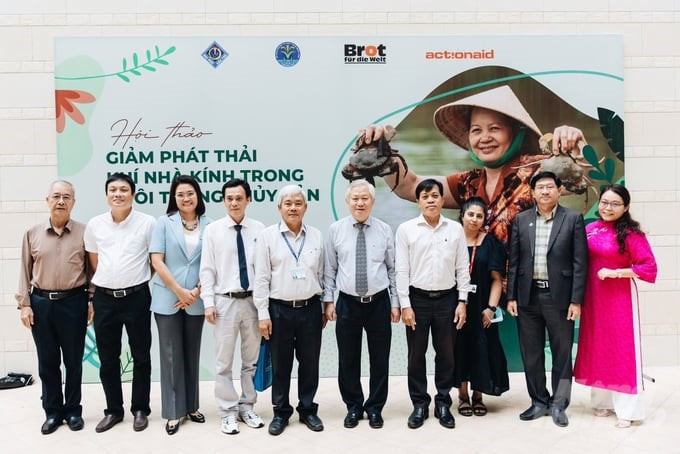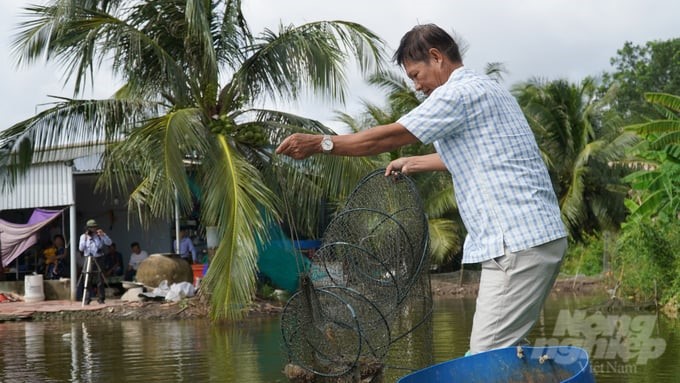May 21, 2025 | 06:37 GMT +7
May 21, 2025 | 06:37 GMT +7
Hotline: 0913.378.918
May 21, 2025 | 06:37 GMT +7
Hotline: 0913.378.918

Deputy Director of the Bac Lieu Department of Agriculture and Rural Development Nguyen Trung Hieu, shared about the measurement of greenhouse gas emissions from shrimp ponds. Photo: Ho Thao.
Recently, in Can Tho city, Can Tho University, in collaboration with ActionAid International Organization in Vietnam and the Bac Lieu Department of Agriculture and Rural Development, organized the workshop "Reducing Greenhouse Gas Emissions from Aquaculture". The event attracted the participation of representatives of aquaculture management agencies and shrimp farmers in the Mekong Delta provinces.
The event organizers said that the activity of monitoring greenhouse gas emissions in shrimp farming ponds is part of the project "Energy Conversion and Climate Change Adaptation in the Mekong Delta," sponsored by Bread for the World Organization and ActionAid International in Vietnam.
According to the representative of the research team at the Faculty of Environment and Natural Resources (Can Tho University), the results of measuring the amount of greenhouse gas emissions from shrimp farming ponds in Dong Hai district, Bac Lieu province, show that the model of intensive shrimp farming emits 15 times more greenhouse gases than extensive shrimp farming models. To be more specific, on average, 1 hectare of the intensive shrimp farming pond emits about 500 tons of CO2 into the environment each year. Of which, electricity and feed are the two main sources of emissions. In particular, electricity consumption contributes 82% and feed contributes 18% to total greenhouse gas emissions.

Representatives of the event organizer took souvenir photos. Photo: ActionAid International in Vietnam.
Dr. Le Anh Tuan, Faculty of Environment and Natural Resources (Can Tho University), said that to reduce the amount of greenhouse gas emissions from shrimp farming ponds, farmers have been instructed to focus on reducing electricity consumption, using renewable energy sources, and composting biogas to treat waste in ponds. At the same time, change feeding methods, adjust shrimp stocking density, and improve the water treatment system to ensure a reduction in shrimp mortality rates. After nine months of implementing these measures in Bac Lieu, greenhouse gas emissions from shrimp farming ponds have decreased by 17% for the extensive shrimp farming model and nearly 11% for the intensive shrimp farming model.
At the workshop, representatives of state management agencies, research agencies, businesses, and shrimp farmers discussed solutions to replicate the shrimp farming model to reduce greenhouse gas emissions in the Mekong Delta. In particular, it is emphasized that issuing guidance documents, organizing training to improve awareness and techniques for shrimp farmers, and establishing favorable policies are important solutions.
According to the funding unit, the project "Energy Conversion and Climate Change Adaptation in the Mekong Delta" is implemented in the period of 2021–2023 in four communes of Dong Hai district (Bac Lieu). Within the framework of the project, 21 clean energy groups with 530 members were established. These groups have supported local people to learn and implement closed shrimp farming processes and install biogas systems to treat waste in shrimp farming.

Shrimp farmers in the Mekong Delta are aiming for a farming process that reduces greenhouse emissions to the lowest level. Photo: Ho Thao.
Ms. Nguyen Thi Hat, in Long Dien Dong commune, Dong Hai district, Bac Lieu province, shared: "I can better control disease epidemics thanks to implementing a new shrimp farming process. At the same time, I can also save about VND 200,000/month for living expenses through the installation of a biogas system. We are very grateful and hope the model is replicated nationwide."
Deputy Director of the Bac Lieu Department of Agriculture and Rural Development Nguyen Trung Hieu said that with the largest shrimp farming area and annual shrimp output in the country, Bac Lieu has been directed by the Prime Minister to become Vietnam’s “shrimp capital”. However, in recent years, the expansion of shrimp farming areas on an intensive and super-intensive scale to meet export demand has caused negative impacts on the environment.
Therefore, measuring the amount of greenhouse gas emissions from shrimp ponds, identifying the main emission sources, and proposing appropriate intervention measures to help reduce the amount of greenhouse gases emitted during the aquaculture process is a sample model in aquaculture that needs to be replicated in the coming time.
Translated by Huyen Vu Thu

(VAN) In 2024, over 295 million people across 53 countries and territories faced acute hunger—an increase of almost 14 million people compared to 2023, while the number of people facing catastrophic levels of hunger reached a record high.

(VAN) World Environment Day 2025 (June 5) carries the theme 'Beat Plastic Pollution' continuing to emphasize the global urgency of addressing the plastic waste crisis.

(VAN) This was the assessment shared by experts at the workshop titled 'Assessing the Role and Potential of Low-Emission Rice Production Systems in Vietnam,' held on the morning of May 19.

(VAN) Cai Rong Port is the fisheries control center of Quang Ninh, helping to monitor fishing vessels, combat IUU fishing, and remove the EC's 'yellow card'.

(VAN) The German Agricultural Society (DLG) explores the possibility of establishing a mechanization service center in Vietnam’s Mekong Delta to support farmers in accessing and utilizing advanced machinery.

(VAN) On May 16, the Department of Water Resources Management, in collaboration with the Food and Agriculture Organization of the United Nations (FAO), held a signing ceremony for the GEF-8 project document.

(VAN) Food safety, mechanization, vocational training, and market opening are key areas of cooperation expected between the Vietnamese Government and the Federal Republic of Germany.